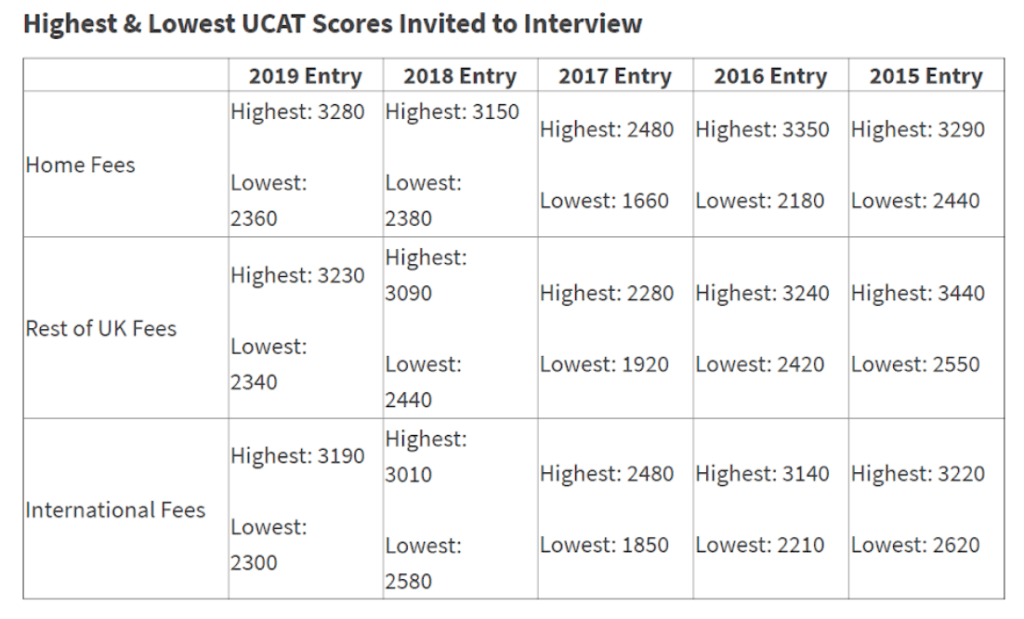
Please note that this blog is just a guideline and we recommend conducting your own research and contacting the universities themselves before making any significant application decisions.
Scored between 650-680 on your UCAT and unsure where to apply?
In the third part of our Where to Apply with a 650 – 680 UCAT Score blogs, we look at a range of other medical schools that favour this type of UCAT score.
Other good UCAT score university options:
Birmingham
UCAT makes of 40% of selection for interview at Birmingham, and GCSEs the remaining 60%.
7 GCSEs are scored. These must include English Language, English Literature, Maths, Biology and Chemistry, plus 2 other subjects, with up to 6 points awarded.
For the UCAT, the overall scores of applicants are separated into deciles and awarded up to 4 points. Be aware these are not the same as the overall deciles published on the UCAT website. Instead, these are the deciles of those applying to Birmingham. They comment these are likely to be different to last year’s deciles, but only marginally (your score is unlikely to move more than one decile). Last year’s deciles can be found here.
Your UCAT and GCSEs collectively give you up to 10 points. Applicants are then ranked on this and a threshold is set, with those above the threshold receiving an interview. Up to 20% of interviews are for ‘contextual applicants’. These are applicants from particular schools – around 90% of state schools are included. The threshold for contextual applicants is lower.
For 2019 entry, the threshold for interview was 8.1, and 5.5 for contextual applicants. For 2018 entry, this was 8.09, and 6.67 for contextual applicants. For 2017 entry, this was 8.12 and 7.08 for contextual applicants. You can calculate an estimate of how many points you will receive on Birmingham’s website.
The Personal Statement is not usually used to select for an interview. The SJT is used at the interview stage.
For international students, the application process is different, with students instead ranked off UCAT score. For 2019 entry, the total threshold score for interview was 2550. Students meeting this threshold then have their non-academic qualities assessed from their personal statement before being invited to interview.
Dundee School of Medicine
At Dundee, applicants are ranked on a combination of academics and overall UCAT score. Academics contributes 60% and has traditionally been scored using both GCSEs and achieved/predicted A-Levels.
Your UCAT is then sorted into one of 10 different groups and given points based on this, contributing the other 40% of the ranking. This means that a low UCAT score can potentially be made up for with some good academics and vice versa.
Strangely, Dundee has removed many details from their website regarding how applications are processed. Therefore, the information below represents what Dundee have said about applications in previous years:
In the words of Dundee themselves: “There is no specific cut-off applied but obviously a high score is advantageous.” So how high are we talking? Well, Dundee state that for the 2016 applicant cohort the average UCAT score of applicants invited for interview was 2740. For 2018 entry, the average UCAT score for all applicants, regardless of interview, was 2590.
Once you are invited to interview, offers are made based purely on interview ranking and information on the UCAS form. The SJT is not used, but in the past Dundee have commented “Band 4 may affect the decision on whether or not to make an offer”. Dundee comments “the high level of competition means the minimum qualifications will rarely secure an interview without an exceptional UCAT score.”
Aberdeen
At Aberdeen, applicants are sorted into deciles depending on their overall UCAT scores. They are then allocated points, which contribute 20% towards the application process. 30% then comes from academic attainment or predictions. GCSEs are not scored.
For academics, Aberdeen will award points for predicted or achieved grades, for example, A levels. An A* at A level will be awarded 27 points, and an A awarded 25 points. Those who have already achieved their A levels will be awarded an additional 5 points.
As for the UCAT, Aberdeen comment: “UCAT is scored based on all applicants to Aberdeen. Applicants total scores are ranked, split into deciles. These deciles are then sub-divided into two. The maximum number of points available is 60. The minimum is 3.” These two elements are used to select for interview (which will contribute the remaining 50%). For 2019 entry, the score to be selected for interview was 110 points.
The SJT is not scored, may be used when making offers to applicants with similar scores. Although the personal statement is reviewed, it doesn’t contribute to the scoring, but will be assessed during the interview.
Amazing academics can compensate for a low UCAT, and vice versa. In fact, for 2018 entry the lowest UCAT score for an applicant given an interview was 2380.
Be aware that for Scottish universities, there are separate places for Scottish students and for students from the rest of the UK. If applying the rest of the UK, there is more competition. For such students, the lowest UCAT score invited to interview for 2018 entry was 2440.
Remember the interview makes up 50% of the overall application. This makes Aberdeen quite unique by using UCAT alongside interview. Most medical schools will forget about your score once you get to the interview stage, but not. If you secure an interview with a low UCAT score, you will have to do especially well at the interview to make up for this. The table below represents the highest and lowest UCAT scores for students invited to interview:

The University of Sheffield Medical School
During the first stage at Sheffield, applicants are screened to ensure they meet the medical school’s minimum academic requirements. Applicants also need to achieve an overall UCAT score of 2420 or greater.
All applicants meeting these requirements will advance to the second stage where they are ranked on their UCAT score. Those with the highest UCAT will be invited to interview.
For 2019 entry the cut off score for interview was 657.5, for 2018 entry 672.5, and for 2017 entry 667. with Sheffield commenting the cut off points “fell around the 70th-73rd centile”. So, to stand a good chance of an interview, a UCAT in the top 30% is likely needed, possibly higher.
Sheffield also comment that there is no ‘academic compensation’. This means exceeding their minimum academic requirements will not make up for a low UCAT score. At interview, there will be 8 stations, with the SJT serving as a virtual ‘ninth’ circuit. This means your UCAT score will not be used at the interview stage, but your SJT will.
Your personal statement is not scored.
Words and Research: Daniel Huddart
